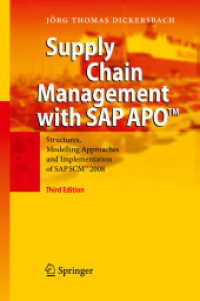- ホーム
- > 洋書
- > ドイツ書
- > Social Sciences, Jurisprudence & Economy
- > Politics, Society, Work
- > social science
Full Description
Several specialized topics are also discussed in detail, including household surveys, telephone and web surveys, natural resource inventory surveys, adaptive and network surveys, dual-frame and multiple frame surveys, and analysis of non-probability survey samples.







